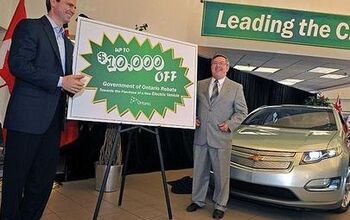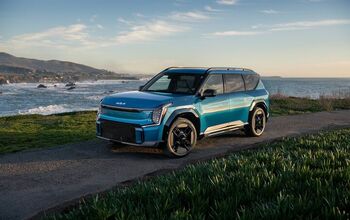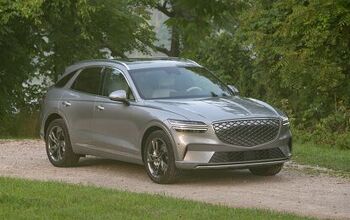Volt Birth Watch 183: A Crucial Clarification
In case you were wondering, Ed Whitacre’s assessment that the Volt will “make a margin” at a price point “in the low 30s” is the GM Chairman/CEO’s second big lie in as many weeks. Well, lie might be a bit harsh. Gross and willful misrepresentation is probably more accurate. GreenCarReports‘ John Voelcker got in touch with a GM spokesman who confirms what we all pretty much knew from the get go: GM “has not officially announced final Volt pricing, a price in the low 30’s after a $7,500 tax credit is in the range of possibilities.” In other words, we’re back to the same old $40k-ish number that GM execs have been throwing around for ages. Unless GM is talking about the electric-only (non-range-extended) Volt that Bob Lutz recently confirmed. But what about the margin thing?
The only real explanation for any reduction in Volt build costs would probably come on the battery side, and sure enough GM has already bragged that it will get Li-ion packs down to $500 per kw/h within the next year or so. Of course Toyota has basically laughed off this possibility, saying they’d buy up any of these mythical battery packs if they were actually available.
But mass production is a wonderful thing. Maybe, just maybe, GM could order enough battery packs from its Volt Li-ion supplier LG Chem to bring the price down, right? Wait, what’s that? GM has just signed a deal with an all-new batter supplier called SB LiMotive (a JV between Bosch and Samsung)? “We have been conducting joint research into automotive batteries with SB LiMotive and there is a strong possibility that the company will be chosen,” a GM source tells the Chosun Ilbo. “However, that does not mean we will change our supply orders from LG Chem.” Huh? Unless these (relative) newcomers have come up with something that A123, BYD, LG Chem, Panasonic and the other big battery firms aren’t aware/capable of, how does it makes sense for GM to not stick with LG Chem and work out the costs of the already-chosen battery pack? Color us confused.
More by Edward Niedermeyer
Latest Car Reviews
Read moreLatest Product Reviews
Read moreRecent Comments
- EBFlex Honda all day long. Why? It's a Honda.
- Lou_BC My ex had issues with the turbo CRV not warming up in the winter.I'd lean to the normally aspirated RAV 4. In some cases asking people to chose is like asking a Muslim and Christian to pick their favourite religion.
- 3-On-The-Tree Agree turbo diesels are probably a different setup lower compression heat etc. I never towed with my rig and it was all 40 miles round trip to work with dealer synthetic oil 5,000mi changes. Don’t know the cause but it soured my opinion on turbo’s plus the added potential expense.
- DesertNative More 'Look at me! Look at me!' from Elon Musk. It's time to recognize that there's nothing to see here, folks and that this is just about pumping up the stock price. When there's a real product on the ground and available, then there will be something to which we can pay attention. Until then, ignore him.
- Bkojote Here's something you're bound to notice during ownership that won't come up in most reviews or test drives-Honda's Cruise Control system is terrible. Complete trash. While it has the ability to regulate speed if there's a car in front of you, if you're coasting down a long hill with nobody in front of you the car will keep gaining speed forcing you to hit the brakes (and disable cruise). It won't even use the CVT to engine brake, something every other manufacturer does. Toyota's system will downshift and maintain the set speed. The calibration on the ACC system Honda uses is also awful and clearly had minimum engineering effort.Here's another- those grille shutters get stuck the minute temperature drops below freezing meaning your engine goes into reduced power mode until you turn it off. The Rav4 may have them but I have yet to see this problem.


































Comments
Join the conversation
This in reply to Angela von Arlington in the light that she may now be remotely interested : - It is true a small battery will freeze in the dark but this is not a small battery like the 1.3Kwh installed in the Prius. The VOLT's 16.8 Kwh batttery pack is a honking great mass of at least 1000lbs and will not cool down easily. Its thermal time constant will be in the tens of hours. It is envisaged that the designers will have the pack well insulated against the outside ambient temperature and that internal battery warmers are sized to maintain the pack at an operational temperature. There should be ample time to do any necessary reheating during an overnight re-charge. The dilemma here is that ideally you should want to keep the battery cold when not in use both to reduce self discharge and improve battery longevity. Finally, I am disappointed that this vehicle was conceived at all. At the price point necessary to be profitable it will undoubtedly be a flop. That said, I believe there is still a strong case for a pure electric which doesn't have to compete with a gasoline vehicle over the range issue. And there could also be a demand for a gasoline vehicle with a simple electric transmission which relies on electricity generated on demand.
GM doesn't need volume from the Volt immediately to get the cost down. It's the platform that's important, not the car. Having range extension in the form of an on-board fueled generator is a huge advantage over electric-only limited range. 10,000 - 40,000 cars sold in first iteration will crack open the door to cost reduction. As cars become more electric and electronic, the economics familiar to us in consumer electronics and computing will ramp in to some degree. How quickly is in some respect related to volume adoption but not strictly so. When laptop computers were over $10,000 in today's money and the meager batteries for them cost a similarly-inflation adjusted $600, sales were quite modest, but deflation in cost began in earnest because everyone in the market was certain demand would uncork as price fell. Still, it took early adopters to get such devices into circulation for common visibility. Same with everything else that's Li-Ion powered digital. Yes, cars are more complex and are electro-mechanical in a scalar way, and the batteries are much bigger. Change comes much more slowly in battery chemistry than in electronics. But electronics efficiency is on an upward ramp, as it true of motors, so the entire burden doesn't rest on battery chemistry advancements alone. There are still *plenty* of people who can afford $40,000 cars, a subset of whom will pony up for a thumb in the eye to OPEC. All GM needs is for the Volt to have a perception impact far in excess of its actual volume, and for owners to come to understand (as few people do now) the reality of an electro-motive car with an onboard range extender. If they achieve momentum in the perceptual arena (which they did on tiny volume with the EV-1), the $40K intro price will come to be seen as moderate, with mainstream affordability on the horizon. As for me, it's hard to imagine paying *less* than $40k for a car, so I'll be a candidate for early adoption. There will be enough people who want to be part of moving this platform forward. Phil